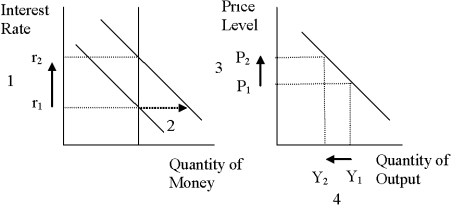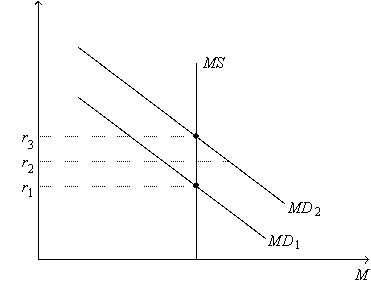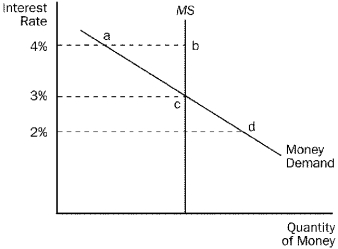Exam 34: The Influence of Monetary and Fiscal Policy on Aggregate Demand
Exam 1: Ten Principles of Economics387 Questions
Exam 2: Thinking Like an Economist569 Questions
Exam 3: Interdependence and the Gains From Trade463 Questions
Exam 4: The Market Forces of Supply and Demand606 Questions
Exam 5: Elasticity and Its Application524 Questions
Exam 6: Supply,demand,and Government Policies593 Questions
Exam 7: Consumers,producers,and the Efficiency of Markets496 Questions
Exam 8: Application: The Costs of Taxation453 Questions
Exam 9: Application: International Trade441 Questions
Exam 10: Externalities473 Questions
Exam 11: Public Goods and Common Resources388 Questions
Exam 12: The Design of the Tax System499 Questions
Exam 13: The Costs of Production507 Questions
Exam 14: Firms in Competitive Markets502 Questions
Exam 15: Monopoly541 Questions
Exam 16: Monopolistic Competition521 Questions
Exam 17: Oligopoly428 Questions
Exam 18: The Market for the Factors of Production477 Questions
Exam 19: Earnings and Discrimination425 Questions
Exam 20: Income Inequality and Poverty399 Questions
Exam 21: The Theory of Consumer Choice492 Questions
Exam 22: Frontiers of Microeconomics380 Questions
Exam 23: Measuring a Nations Income464 Questions
Exam 24: Measuring the Cost of Living452 Questions
Exam 25: Production and Growth457 Questions
Exam 26: Saving,investment,and the Financial System502 Questions
Exam 27: The Basic Tools of Finance461 Questions
Exam 28: Unemployment610 Questions
Exam 29: The Monetary System461 Questions
Exam 30: Money Growth and Inflation427 Questions
Exam 31: Open-Economy Macroeconomic Models488 Questions
Exam 32: A Macroeconomic Theory of the Open Economy404 Questions
Exam 33: Aggregate Demand and Aggregate Supply511 Questions
Exam 34: The Influence of Monetary and Fiscal Policy on Aggregate Demand451 Questions
Exam 35: The Short-Run Trade-Off Between Inflation and Unemployment415 Questions
Exam 36: Six Debates Over Macroeconomic Policy273 Questions
Select questions type
Which of the following shifts aggregate demand to the right?
(Multiple Choice)
4.9/5  (44)
(44)
A decrease in the interest rate could have been caused by the money-demand curve shifting
(Multiple Choice)
4.9/5  (25)
(25)
When the money supply increases,there is an excess _____ of money.As a result,interest rates _____ and aggregate demand _____.
(Short Answer)
4.9/5  (37)
(37)
Government expenditures on capital goods such as roads could increase aggregate supply.Such effects on aggregate supply are likely to matter more in the short run than in the long run.
(True/False)
4.9/5  (40)
(40)
According to liquidity preference theory,investment spending would rise if the price level
(Multiple Choice)
4.9/5  (32)
(32)
If money demand shifted to the right and the Federal Reserve desired to return the interest rate to its original value,it could
(Multiple Choice)
4.8/5  (42)
(42)
The government's choices regarding the overall level of government purchases and taxes is known as _____.
(Short Answer)
4.8/5  (32)
(32)
Some economists,called supply-siders,argue that changes in the money supply exert a strong influence on aggregate supply.
(True/False)
4.8/5  (32)
(32)
Figure 21-3.  -Refer to Figure 21-3.What quantity is represented by the vertical line on the left-hand graph?
-Refer to Figure 21-3.What quantity is represented by the vertical line on the left-hand graph?
(Multiple Choice)
4.8/5  (43)
(43)
Suppose that the Federal reserve is concerned about the effects of rising stock prices on the economy.What could it do?
(Multiple Choice)
4.8/5  (34)
(34)
A significant lag for monetary policy is the time it takes to for a change in the money supply to change the economy.A significant lag for fiscal policy is the time it takes to pass legislation authorizing it.
(True/False)
4.9/5  (38)
(38)
Figure 21-4.On the figure,MS represents money supply and MD represents money demand.  -Refer to Figure 21-4.Which of the following events could explain a shift of the money-demand curve from MD1 to MD2?
-Refer to Figure 21-4.Which of the following events could explain a shift of the money-demand curve from MD1 to MD2?
(Multiple Choice)
4.9/5  (38)
(38)
Figure 21-1  -Refer to Figure 21-1.There is an excess demand for money at an interest rate of
-Refer to Figure 21-1.There is an excess demand for money at an interest rate of
(Multiple Choice)
4.7/5  (28)
(28)
Showing 401 - 420 of 451
Filters
- Essay(0)
- Multiple Choice(0)
- Short Answer(0)
- True False(0)
- Matching(0)